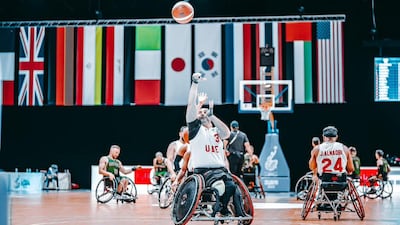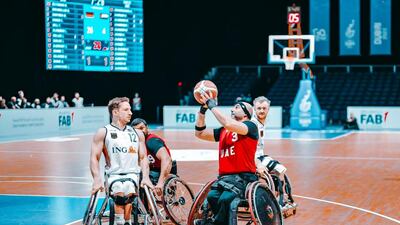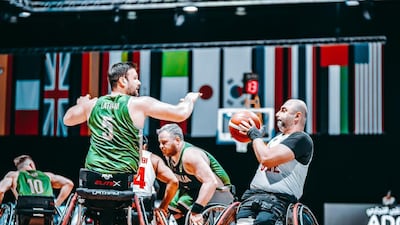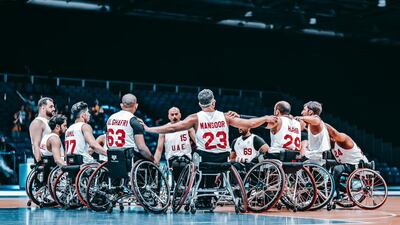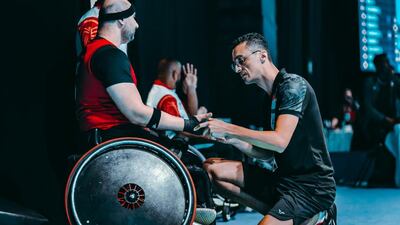An Emirati wheelchair basketball star has hailed the power of sport to bring society together - and issued a plea for parents to help children with disabilities to get involved.
Mohammed Al Zarooni has proudly represented the Emirates in international competition for more than 22 years and was part of the national team taking part in the Wheelchair Basketball World Championships, which concluded in Dubai on Tuesday.
The major event, staged in the Middle East for the first time, saw 350 men and women take to the court for a shot at global glory.
Emirati wheelchair basketball player
Now a seasoned veteran at 42, Al Zarooni is eager for the next generation to lead the UAE to future success in the sport.
He is also keen for more children with all forms of disabilities to be given the opportunity to take part, saying his own experiences made him a better person.
“I want to tell parents, 'speak up for your children'. Take them to special needs clubs that each city has,” he said in an interview with The National.
“We are searching for people with disabilities to be part of our team. For the last five years we have had no new players. Each year if we get more players, we can practice and improve."
Sport brings people together
The success of the Special Olympic World Games - hosted in Abu Dhabi four years ago - helped shine a light on the significant role sport can play in paving the way for a more inclusive future.
The UAE has sent the region's largest delegation to the latest competition, currently being held in Berlin, including 72 athletes with intellectual and developmental disabilities taking part in 20 sports.
The equality mission extends to bolstering female participation, with the UAE yet to field a women's team in the wheelchair basketball world championships.
The first step was taken this week when a UAE women’s team comprising Emirati athletes and expatriates from Bahrain and Yemen played a friendly during the world championships.
UAE leaders have often spoken of their vision for more athletes with special needs to compete and for sports to be more inclusive.
Mixed teams of Emiratis and expatriates with special needs participated in football and other sports during the World Special Olympics hosted in Abu Dhabi.
“This is not only about locals, we want non-locals to come to play with us also,” Al Zarooni said.
“Sports brings people together. When I go to the club I become better person. In case children don’t like sports, they can find something else they enjoy at the club.
“In the Dubai wheelchair basketball group we have three locals and nine non-locals, so it’s a diverse team – most of them are born in the UAE and speak Arabic.”
The past month has been filled with excitement with UAE hosting the Wheelchair Basketball World Championships.
The UAE made its debut at the International Wheelchair Basketball Federation event and as hosts had the opportunity to play against top athletes.
The UAE has often played against wheelchair basketball teams in the region but this is the first time players watched teams from the US, Netherlands, Canada and Brazil compete live.
“What we see on YouTube or on television, we saw in front of us. We got to see famous players like Patrick Anderson in action,” he said of Canada’s Anderson, a three-time Paralympic gold medallist and ambassador for the sport.
“It was privilege to be the part of the world cup as a host.
“We got to see technique and tactics live before us, it was an excellent experience. I know we will improve and become better players.”
Collisions and injuries
Wheelchair basketball is a fast-paced game with five players on the court at any one time.
Strapped into their wheelchairs, players often collide, tumble and quickly push themselves up to continue the game.
Athletes have various disabilities, some have paralysis due to accidents, others like Al Zarooni have congenital or birth disorders in their lower limbs.
The game is played by athletes who have physical impairments that prevent them from running or jumping.
It does not prevent Al Zarooni and the other athletes from swiftly covering the court in wheelchairs as they weave between their opponents, swerve and pass the ball.

“It’s very intense, very aggressive so people get dislocation, bruises, cuts,” said Al Zarooni, who began playing sports at the Al Thiqah Club for the Disabled in Sharjah at the age of 19.
From competing in wheelchair races, swimming, table tennis and weightlifting, he began specialising in basketball and racing.
He has several medals representing the UAE in wheelchair basketball and badminton.
“You cannot avoid injuries and bleeding even in training," he said.
“My brake is my hand and fingers.
“We run, moving the wheelchair with our hands and we also take the shots with our hands.
“So this is more difficult than those who are able (bodied) because they run with their legs and shoot with their hands.
“It takes a lot of energy and strength physically and mentally.
“You cannot avoid collisions."
Will not stop fighting
The veteran beat cancer in 2017 and recovered from a debilitating operation after which he lost his sense of balance.
His spirit and mental strength got him back on the court despite bouts of dizziness and vomiting.
“The doctors said maybe one side would be paralysed but slowly, slowly I came back,” he said.
“I didn’t stop because the doctors said I could push to the limit in the wheelchair.
“I may be old but I will keep fighting, I will not stop.”
Support from his colleagues means a great deal and Al Zarooni is appreciative that Dubai Municipality, his employer, allows him time to play for the UAE.
“They watch my games sometimes and always wish me luck, motivate me to continue to be part of the national team,” he said.
He enjoys guiding younger members as much as he does staring down opponents.
“When you sit in a wheelchair with the straps on your hips it’s as if it cuts off your blood circulation,” he said.
“Nails come off, our hands are cut, we get bruises, this is all difficult but normal.
“When we control our breathing and shoot, it feels like the next level and I will never stop.”
